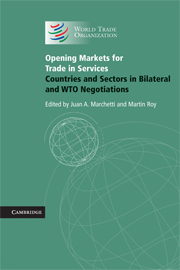Book contents
- Frontmatter
- Contents
- List of figures
- List of tables
- List of boxes
- List of contributors
- Foreword
- Acknowledgments
- Disclaimer
- Summary and overview
- PART I From Policy to Negotiations
- PART II Multilateral and Bilateral Negotiations on Services: Overall Perspectives
- 2 Services liberalization in the WTO and in PTAs
- 3 PTAs in services: friends or foes of the multilateral trading system?
- PART III Challenges, Issues and Opportunities in Services Sectors
- PART IV Country Experiences with Services Trade
- Index
- References
2 - Services liberalization in the WTO and in PTAs
Published online by Cambridge University Press: 05 December 2011
- Frontmatter
- Contents
- List of figures
- List of tables
- List of boxes
- List of contributors
- Foreword
- Acknowledgments
- Disclaimer
- Summary and overview
- PART I From Policy to Negotiations
- PART II Multilateral and Bilateral Negotiations on Services: Overall Perspectives
- 2 Services liberalization in the WTO and in PTAs
- 3 PTAs in services: friends or foes of the multilateral trading system?
- PART III Challenges, Issues and Opportunities in Services Sectors
- PART IV Country Experiences with Services Trade
- Index
- References
Summary
The first decade of this century has been characterized by intensive trade negotiations. Countries all over the world have resorted to a plethora of fora and mechanisms to enhance trade opportunities overseas. Negotiations at the WTO have been ongoing since November 2001 under the umbrella of the Doha Development Agenda. In parallel to that, many new preferential trade agreements have entered into force.
One of the salient aspects of these PTAs is the inclusion of disciplines for the liberalization of trade in services. A novelty two decades ago when the issue was introduced into the multilateral trade agenda, services trade has become a prominent and sometimes unavoidable feature of trade negotiations.
This flurry of PTAs has spurred interest and concern among academics and policy-makers, who wonder about countries' motivations for signing these agreements in the context of ongoing multilateral trade negotiations, and about their impact on trade flows and the multilateral trading system.
Save for studies on the type of obligations and liberalization modalities used by services PTAs, research with regard to preferential trade in services is rather in its infancy. The main purpose of this chapter is to contribute to this research by building upon previous work to assess the market access achievements of services PTAs and by discussing the implications for the multilateral trading system. In so doing, the chapter aims to deal not only with PTA negotiations and liberalization but also with multilateral negotiations. This provides a natural point of comparison.
- Type
- Chapter
- Information
- Opening Markets for Trade in ServicesCountries and Sectors in Bilateral and WTO Negotiations, pp. 61 - 112Publisher: Cambridge University PressPrint publication year: 2009
References
- 7
- Cited by



